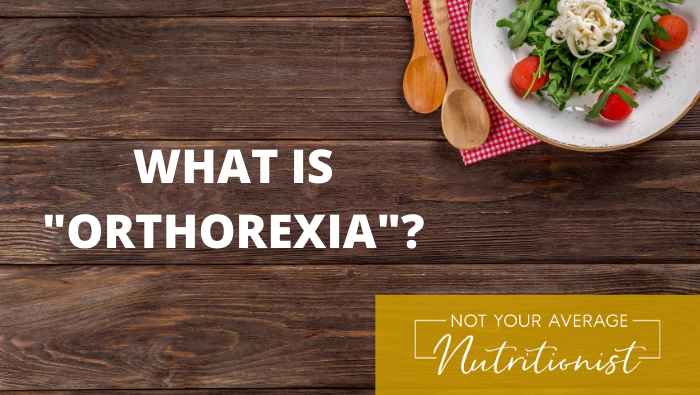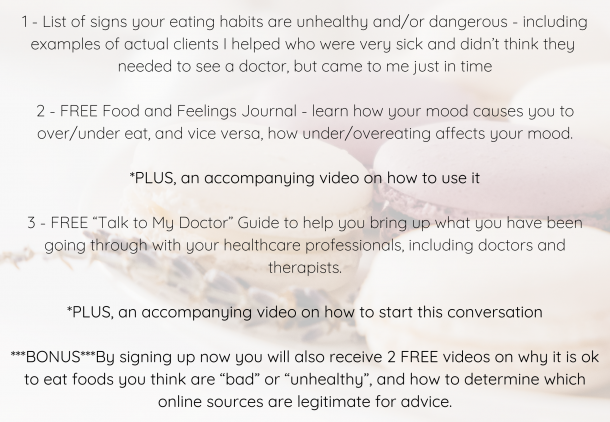By Jessica Cushing-Murray
Jessica Cushing-Murray is a recent grad of UCLA, where she was a member of the Cross Country/Track teams. She is currently working in the behavioral health field, and pursued a Masters in Nutrition – now headed to med school! She can usually be found reading and/or drinking coffee!
Anorexia, bulimia, obsessive-compulsive disorder. These are terms that are pretty universally known to the general population. But “orthorexia”? Not so much.
“Orthorexia” is defined by the National Eating Disorders Association (NEDA) as, “an obsession with proper or ‘healthful’ eating.” It is a fairly new term to describe those people you may know who are always looking at the nutritional labels on their food or can’t seem to eat food if they don’t know exactly what ingredients are in it. Orthorexia was coined only in the past couple of decades, and awareness of this term is increasing as the number of people concerned about “healthy” eating increases simultaneously. A deeper definition of the term originates from the man who coined the term himself, Dr. Stephen Bratman, who expressed, “Orthorexia commonly begins as an “exuberant” interest in healthy eating that escalates over time. What was originally a choice becomes a compulsion and the individual can no longer choose to relax their own rules. Eventually, the person’s restrictive eating starts to negatively impact both their health and social and occupational functioning; eating the right foods becomes increasingly important and squeezes out other pursuits.”
So why has orthorexia become a condition recognized by NEDA and important to us today?
It is an interesting phenomenon when a condition such as this one can be tied to society’s standards, as well as growing regulations put in place for nutrition in first-world countries. By this, I mean that all chain restaurants are now required to keep a copy of their nutritional facts in every restaurant for their consumers’ reference. Likewise, most places we eat have the calories, fat, and carbohydrate contents all directly on the menu, where these facts can sway anyone toward or away from certain meals based on the number of calories next to that food. In addition, there is a newer emphasis on vegetarian and vegan options, or a page of the menu that is classified “600 calories or less” and “lite meals.” All of these are ways that calories and nutrition facts are seemingly “thrown in our faces” everywhere we go, which certainly may correlate to the development of orthorexia.
In terms of treatment and diagnoses, Orthorexia is not specifically recognized as it’s own disorder in the Diagnostic and Statistic Manual (DSM) that health professionals abide by. This makes it very difficult to “diagnose” people as orthorexic. However, orthorexia itself is an obsession with healthy eating, so it is often thought of as combination of a classified eating disorder (such as anorexia) paired with a form of obsessive-compulsive disorder (OCD). Therefore, people who are be orthorexic may be constantly reading nutrition facts and ingredient labels, and may refuse to eat certain foods if the nutrition facts or other factors do not meet their ‘health’ standards. In addition to reading labels, someone who is orthorexic likely eats the same few foods or meals every day because they have deemed these specific foods as “acceptable.” People suffering from orthorexia may–in a similar way to those with eating disorders like anorexia– completely cut out certain food groups from their diets. Things like “carbs” or “all meat” or “all animal products.” Or they may have other ways of deeming foods as acceptable such as if the food is grown organically or locally. They likely do this for a couple of reasons: the foods they are rejecting are not ‘pure’ or ‘healthy’ enough, but also because it makes it easier to continue with their orthorexic behavior in front of other people. Think about it: someone who randomly and completely stops eating meat looks suspicious, but if they can say to their friends that they have decided to adopt a vegetarian diet, now they have a reason to have cut an entire food group out of their diet without looking unhealthy. Lastly, another important sign of someone who may be suffering from orthorexia is someone who will become visibly distressed when there are no ‘healthy’ food options at an event, or if they are unable to find the nutrition facts or ingredients list for the food in front of them.
Orthorexia can look tremendously like a person who simply took the “eating a healthy diet” lifestyle to the extreme and is now obsessed with only eating very specific “healthy” foods. It is important to recognize and educate yourself on terms like orthorexia, because it has a likeliness to develop into other classified eating disorders, can lead to malnutrition based on the restriction and specificity involved, and can be very harmful to individuals suffering from it. Though orthorexia is not yet classified as its own official diagnosis (though it is currently diagnosed under “other specified feeding and eating disorders” in the DSM-5), the obsession our society has today with staying “fit” and “healthy” is sure to lead to increased prevalence of people becoming orthorexic. While reading this post you may have even had certain people in your life come to mind.
Awareness and education are powerful tools to utilize in helping people whose mantra of “living healthy” has ultimately become the dangerous opposite. The good news is: by reading this post, you just took the first step. See the links below for more information and signs/symptoms of people who may be suffering from Orthorexia.
If you need help recovering from Orthorexia, or another kind of eating disorder, reach out to our Dietitians today! Contact Dietitian Libby Parker HERE.
References
- https://www.psychologytoday.com/us/blog/eating-disorders/201902/orthorexia-10-signs-you-should-seek-help-now
- https://www.verywellmind.com/orthorexia-nervosa-when-healthy-eating-becomes-extreme-3890297
- https://www.nationaleatingdisorders.org/learn/by-eating-disorder/other/orthorexia
- https://www.webmd.com/mental-health/eating-disorders/what-is-orthorexia
- https://www.ncbi.nlm.nih.gov/pmc/articles/PMC6234674/
- https://www.nedc.com.au/eating-disorders/eating-disorders-explained/types/other-specified-feeding-or-eating-disorders/


